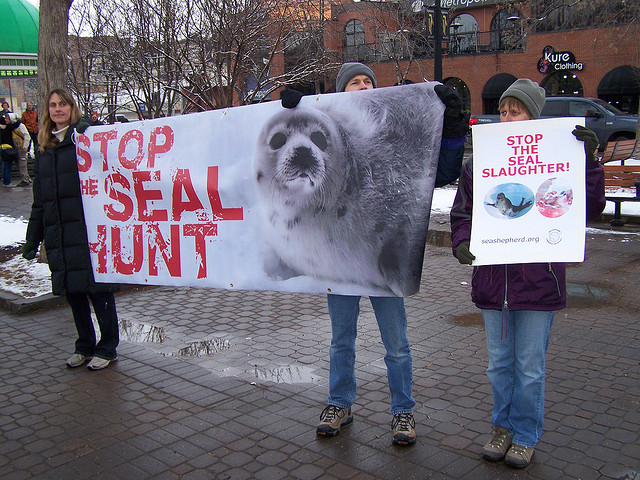Print Edition: November 6, 2013

What do the Humane Society of the United States (HSUS), a couple of celebrity chefs, and every armchair activist that ever shouted at injustices from their comfortable seat have in common? They all are attempting to boycott Canadian seafood.
Their purpose? To halt the yearly slaughter of wide-eyed baby harbour seals.
The boycott itself was called as far back as 2005. Since then, thousands of grocery stores and restaurants have committed to the boycott, which would end once the Canadian government stops the commercial hunting of seal.
Several high-profile chefs—including Michael Symon and Mario Batali—have also announced their support for the cause.
So begins a heated battle in the world of cookery.
Celebrity chef Anthony Bourdain recently began a Twitter campaign against the boycott, suggesting that a ban on the seal hunt would spell doom for the indigenous natives who have been hunting seals for thousands of years. According to the Globe and Mail, Bourdain spent time in northern Quebec with Inuit seal hunters. Without the annual seal hunt, he argues, Inuit peoples would be forced to move, or else face starvation.
“I completely understand well meaning intentions of good-hearted chefs who signed this petition,” Bourdain tweeted. “But they are wrong. Visit the Inuit.”
The rationale behind the boycott is to force the Canadian Department of Fisheries and Oceans to cancel the hunt by stemming Canada’s export of seafood to the United States. On the surface, it’s a good plan; 60 per cent of our seafood export makes its way to our southern neighbors.
The HSUS is calling Bourdain’s criticism “misinformation.” It might be. The boycott is not targeting traditional Aboriginal hunts. The ban the EU placed on the import of seal hunt products from Canada is also limited to non-Inuit product, so it is possible that there would be no serious repercussions for Aboriginal hunts.
However, the implications of the boycott go deeper than a controversy of economics.
The hysteria surrounding the seal hunt is darkly humorous when you consider that in Canada alone approximately 650 million animals are slaughtered for consumption every year. Most of us know that these animals are treated far worse for far longer than a seal pup. Animals raised for slaughter undergo the most inhumane treatment imaginable, simply for the sake of our gastronomic preferences.
A recent report released by the Environmental Investigation Agency on Japan’s hunts of dolphins, porpoises, and small whales suggests that several species have been “overhunted beyond the point of recovery,” according to the Vancouver Sun.
So, where is the boycott on Japanese seafood? Or are endangered whales not photogenic enough for the Humane Society?
There’s nothing like the soulful face of a baby seal, hunted at about two weeks old, to tug at the heartstrings.
The HSUS knows how to play this to their advantage. The information page on their website regarding the seal hunt uses some choice emotive descriptors when referring to the seals being slaughtered. It’s not just a harbour seal; it’s a “25-day-old fuzzy baby seal.” Save the seals: donate to HSUS.
It seems that the cuter the animal, the more value is placed on its well-being. Or perhaps, in those big sad eyes, we are suddenly confronted with something that we have been unable, or unwilling, to see before. They too can suffer. It should never be a question of intelligence, the ability to reason, to recognize oneself in a mirror, talk, or be domesticated. The only question that is important is their ability to suffer, and our ability to keep that suffering to a minimum.
Marine ecologist Jacques Cousteau once criticized our reaction to the seal hunt, arguing in favour of focusing on other, more important causes.
“We have to be logical. We have to aim our activity first to the endangered species. Those who are moved by the plight of the harp seal could also be moved by the plight of the pig – the way they are slaughtered is horrible.”
While Canada’s annual seal hunt is horrific, our reaction to it is purely emotional. Harbour seals are thriving as a species; there are other endangered animals at risk that need far more attention than they are being given, and other animals who experience far more cruelty at our hands than do harbour seals.


